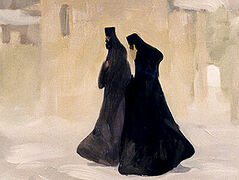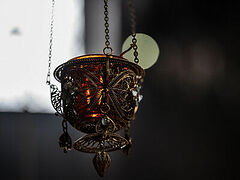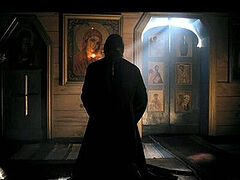The question of the existence of elders in our days as possessors of a special spiritual experience remains relevant and occupies people’s minds, who sometimes invest a very different meaning into it, according to their own ideas and expectations. You can often find contradicting attitudes to this question among monastics too. The Russian Church’s Synodal Department for Monasteries and Monasticism spoke about the traditions of eldership and elders with Hieromonk Isaac, a resident of Optina Monastery, dedicated to the Entrance of the Theotokos into the Temple.
Paradise is the attainment of freedom
—For young, modern man, one of the main values is freedom. People are afraid of losing their personal freedom; they’re pained to see its restriction. To entrust your will to an elder, you have to be completely sure that this man truly has spiritual experience and will benefit your soul as a novice. But how can you not doubt that your guide is an elder worthy of you limiting your freedom for?
—If we consider life in a monastery, then we have those who are older in obedience, there’s an abbot. Besides the spiritual father, in communication with whom the relationship of elder and disciple is formed, there are many other constituent elements of obedience that also must be fulfilled. After all, without obedience and humility, man, even a secular man, can’t lead a normal life. From childhood, we listen to our parents, our teachers, and as adults—our bosses, our relatives, or even the advice of experienced people. Obedience in one form or another lies at the heart of any relationship. After all, if we are guided only by our own mind, if we’re stubborn, if we get into fights, this doesn’t lead to anything good. Therefore, whatever doubts we have, if a man took monastic vows, including the vow of obedience, he must in any case lead his life in accordance with these vows. It’s the only way he can gain the opportunity to find inner freedom.
In other words, in limiting his inner freedom, he uncovers the inner freedom of the spirit, which consists in being with God. After all, Paradise is the attainment of freedom. In Paradise, man doesn’t independently determine what to do. He enters into a personal relationship with God, and such questions become unnecessary. There are no other, superfluous aspirations in Paradise, but this is what it means to find the true freedom we were created for. This is the freedom of communication with God. If you don’t have this freedom, there is slavery to sin and demonic forces. Obedience to God is that freedom we should strive for. It cuts off the very possibility of departing from the Lord, and that’s why, in order to devote himself to the sole goal of being with God, man must refuse the egotistical freedom of personal self-determination.
—It sounds rather challenging for a man living in our days to refuse the freedom of self-determination…
—Yes, most people now are led only by their own aspirations. And, as we see, this leads to numerous internal tragedies. For example, why has the number of nervous and psychological illnesses, such as depression, risen so sharply in modern society? Because of this pseudo-freedom, where a man often can’t find his happiness and spends his whole life running around in search of it…
To revive human souls for eternal life
—The great Russian writer Dostoyevsky, who introduced the cultural society of Russia of his time to Optina eldership, wrote such words: “The salvation of Russia will come from the monastic cell.” Is this still relevant in our days, in your view?
—He said this because he personally knew people who lived in these cells. It was the golden age of Optina eldership. Every man who came to the monastery with his pain or his problems, after talking with an elder, would as if fly on wings out of his tiny cell and feel that all life around him had been transfigured after such a meeting. Dostoyevsky experienced this himself. He went to Optina in a state of deep sorrow after the death of his son Alyosha. This event so shocked him that his thoughts about the “tear of a child,” or about why God allows the suffering of innocent babies, were placed in Ivan’s monologue in the novel The Brothers Karamazov. And only when Dostoyevsky spoke with Elder Ambrose did he regain a taste for life. Having visited Batiushka, he realized how important it is for mankind to have such people thanks to whom the soul can be so transformed that all disasters and problems are solved by the healing power of Divine grace.
 And in this sense, the words of Dostoyevsky truly reflect reality. When a man is deprived of something essential, as the Lord said, the one thing needful, sometimes he also loses the meaning of life. And only a healed soul can find it again. But how can we receive this healing when we don’t have that thread that could help us get out of this confusing labyrinth? How can we find someone who will be a guide and show us the path? A man can’t do it himself; he understands that he needs help, but he doesn’t know how to get it. And in this regard, it’s the monasteries that have always been, as St. Paisios the Athonite said, a kind of beacon for people. The very existence of monasteries gives every man the opportunity to orient himself in this world, to see the light and find the right direction. A wise word or a kind, caring attitude can heal the soul and guide it on the right path.
And in this sense, the words of Dostoyevsky truly reflect reality. When a man is deprived of something essential, as the Lord said, the one thing needful, sometimes he also loses the meaning of life. And only a healed soul can find it again. But how can we receive this healing when we don’t have that thread that could help us get out of this confusing labyrinth? How can we find someone who will be a guide and show us the path? A man can’t do it himself; he understands that he needs help, but he doesn’t know how to get it. And in this regard, it’s the monasteries that have always been, as St. Paisios the Athonite said, a kind of beacon for people. The very existence of monasteries gives every man the opportunity to orient himself in this world, to see the light and find the right direction. A wise word or a kind, caring attitude can heal the soul and guide it on the right path.
Many of our monasteries are called holy places, partly because they have their own spirit-bearing history. Ascetics lived there, who even after death don’t leave the places of their podvigs, and remain their patrons. Thanks to the Heavenly patronage of holy people, that extraordinary atmosphere that Dostoyevsky felt reigns here. The Venerable Elder Joseph was the successor of Elder Ambrose and received people in his hut. When pilgrims would come to talk with him, sometimes he would sit them on Elder Ambrose’s couch, leave them in this small cell, and simply advise them to pray. And unexpectedly for them, all their problems would somehow be resolved of themselves. The invisible presence of the Elder, who had departed to the other world, healed the suffering—and Elder Joseph understood this. Being a disciple of St. Ambrose, he clearly felt this connection, which wasn’t broken even after the Elder’s repose, and he also tried to inspire pilgrims.
He would say: “I believe that everyone who comes to Optina Hermitage will receive satisfaction in any of his needs by the prayers of our holy fathers; they have raised up very, very many for the Heavenly Fatherland, and they don’t cease to raise them now, and take care especially for those who come to their holy remains with reverence.” Thus he spoke about his predecessors, and after his death, he himself also became a patron of Optina, just like Sts. Nikon, Nektary, and the last Optina abbot Monk-Martyr Isaac—glorified among the saints and Heavenly intercessors for our monastery. And whoever is able to open his heart for communication with him will, of course, gain great benefit even from one visit to the monastery and will be able to fully understand the meaning of Dostoyevsky’s words. After all, the purpose of monasteries is for human souls to be reborn unto eternal life.
—Fr. Isaac, did you choose a monastery for yourself, or were you blessed to immediately go to Optina? Do you remember your first impressions of the monastery?
—When I was a parishioner in the early 1990s, there were still very few monasteries, and my spiritual father advised me to go to Optina. So I went, and I never wanted to leave.
I’ve had no experience of going to other monasteries. Optina was the first and only monastery where I joined the monastic brotherhood and became a resident. I was struck at that time by the relations between people here, which are hard to find elsewhere: the spirit of goodwill, mutual support, love, some special peacemaking, the lack of the hustle and bustle… and the obediences themselves, which are close to a simple, natural way of life. This atmosphere, unusual for me at the time, helped me immerse myself in a unique world and get in touch with the tradition of the golden age of Russian monasticism. In the absence of the rhythm of modern life, the soul truly acquires inner harmony, and the services, prayer, regular Confession, especially at the first stage, greatly support the spiritual frame of mind of a monk. Of course, when a man breaks away from his roots and is grafted into a new life, there inevitably arise some difficulties, worries, and internal perplexities, but the opportunity to open his soul and sincerely express everything to a confessor—the opportunity to seek advice—is already healing in and of itself, to help bring your thoughts and feelings into order.
—Have you met elders in the monastery and were you able to feel the living tradition of eldership?
—Of course. After all, we have wonderful confessors among the brethren. First of all, Fr. Iliy, who regularly comes to Optina from Peredelkino. And the previous abbot of the monastery, Archimandrite Benedict (Penkov), and our current abbot—Vladyka Leonid—who received his spiritual upbringing here in Optina; and our skete fathers, hidden from the world under cover of humility, embody the heart of the Optina Hermitage. They are all bearers of the Optina tradition in one way or another.
The very atmosphere, the sanctity of the place, and the tradition of eldership have been strengthened in the monastery since the moment of its foundation, thanks to the great spirit-bearing people who labored here at that time, and largely thanks to Vladyka Evlogy (Smirnov; Metropolitan of Vladimir and Suzdal, †07/22/2020—Ed.), who revived Optina in our days—all of this helps the monastery remain a prosperous monastery in the spiritual sense, though probably not to the same extent as it was under the elders, when anyone who knew about miracles from books could come here and witness such miracles, performed literally right before their eyes. But even now, if we take a closer look at our lives, I think every Optina monk, parishioner, and pilgrim will find some small miracle, somehow connected with visiting Optina or with praying to the Elders.
As Elder Nektary said, and Elder Barsanuphius also mentioned: “Look for great meaning in everything.” There are no random events in a man’s life. They all have spiritual significance. Elder Barsanuphius advised the future St. Nikon, then still a novice, to take note of what events occurred in his life, on which dates, under what circumstances, to learn to see the protection of the saints and God’s providence in his life. And if we carefully look deep within ourselves, we will note that there are many such events, and communication with spiritual people can also be counted among them.
For example, the recently reposed Hierodeacon Iliodor (†10/26/2020) recalled how one time he was traveling with Fr. Iliy to see Fr. Kirill (Pavlov), who was our hierodeacon’s first spiritual father. Fr. Iliodor came under Batiushka Iliy’s guidance when he came to Optina. One day he was in Moscow with Batiushka, and they decided to go see Fr. Kirill. “The two great elders met and just started talking about something. And I looked at them, and the tears started flowing from my eyes. They weren’t really talking about anything special, but such an extraordinary frankness and a special, almost childlike purity of soul were so visible in them that I couldn’t restrain myself from surging emotions, and I just started sobbing,” said Fr. Iliodor. According to him, he became very embarrassed by his tears, and the elders started comforting him. One gave him a piece of candy, and the other some gingerbread. Maybe some wouldn’t have noticed anything special in this conversation of two old men, but a man who lived a genuine spiritual life perceived it as a revelation from God, which greatly affected him and made its way into his heart.
—Is it possible, do you think, to talk about monasteries being able, despite all the existing difficulties, to continue the tradition of eldership in our days too?
—At the very least, the monastic life provides everything necessary for this. The very way of life in our monasteries—the spiritual guidance, the opportunity to reveal thoughts, the obedience, the participation in the Divine services and Mysteries of the Church—provides everything for this tradition to not be interrupted. Living in a monastery, man is delivered from superfluous troubles. He doesn’t think about what to buy, or where to go. Entering in upon the monastic path, we liberate ourselves from the majority of everyday problems. We don’t choose our obediences for ourselves—that’s the abbot’s job. In this regard, the very structure of monastery life has educational value for us and helps the soul acquire lightness.
The liturgical life is also very important in this regard. If in the world a man sometimes has to overcome himself or circumstances in order to go to church, then here, this is all simple. After all, the Divine services, the chance to pray with the brethren in church, has a mystical meaning. The Church is a different, special reality. It wasn’t for nothing that the ambassadors of the Equal-to-the-Apostles Prince Vladimir delighted in the Divine Liturgy in Constantinople, saying they didn’t know where they were—whether on earth or in Heaven. To some this might seem absurd, but, nevertheless, this spiritual reality is more fundamental, more real than all the earthly, material things we see around us, and that make up a man’s life, as many think. As the Apostle James said: For what is your life? It is even a vapour, that appeareth for a little time, and then vanisheth away (Jas. 4:14). In fact, all material things have but one basis on which they can stand—the power of Divine energy. And it’s only when man begins to integrate into this reality that he truly finds the opportunity to live a genuine life, because already here, on earth, he begins to touch it a little. In this regard, in a monastery, the human soul has more chances to draw near to this reality—by fulfilling the Divine commandments, following the path of the spiritual life, including grasping the tradition of eldership, studying the heritage of the Holy Fathers. Thus, there are more opportunities to be participants in true spirituality, which leads us to unity with the Lord, to the Heavenly Kingdom, which already begins here.









